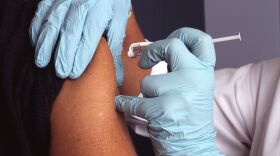Baby Francesca was just 12 weeks old when she came down with a cough. Nine days later, she died of pertussis, better known as whooping cough.
Now, her mother, Veronica McNally, has made it her life's work to teach others why she believes vaccination is so important. She started the Franny Strong Foundation in her daughter's honor. And as of today, she's begun a new campaign called "I Vaccinate."
McNally and Dr. Eden Wells, chief medical executive for the Michigan Department of Health and Human Services, joined Stateside to talk about why vaccination is so important.
Currently, Michigan ranks 43rd in the nation when it comes to immunization coverage for preschoolers. Just 54% of preschoolers are up-to-date on their vaccines (while 29% of teenagers are up-to-date).
As a result, Michigan has seen a rise in serious diseases, which had previously been held at bay or, in some cases, eradicated. We're talking about mumps, whooping cough and Hepatitis A.
So why are Michigan's numbers so low? Dr. Wells says the answer isn't simple.
She says experts and stakeholders met last year to figure out why so many kids aren't getting vaccinated. Poor access to health care was part of the answer, she says, as was the fact that some children likely start their vaccines without finishing the whole series.
"It's probably a bit more complicated than just simply saying it's an anti-vaccine movement," Dr. Wells said.
McNally recognizes many parents who opt out of vaccinations are trying to do the right thing for their children. But the information many of them receive often comes from unreliable sources.
"We need to address the conversations surrounding vaccines and get answers for the parents to their questions," McNally said.
The website IVaccinate.org, part of the campaign launched today, aims to provide those answers.
Still, McNally hopes to communicate two main points:
- There is consensus within the medical community that vaccines are safe and effective;
- Getting children vaccinated is the best thing parents can do to protect their children from vaccine-preventable diseases.
Dr. Wells says when parents make the decision not to vaccinate a child, it's not just that kid they put at risk. They put the entire community at risk.
Listen to the full interview above to hear Baby Francesca's story.
(Subscribe to the Stateside podcast on iTunes, Google Play, or with this RSS link)
_







